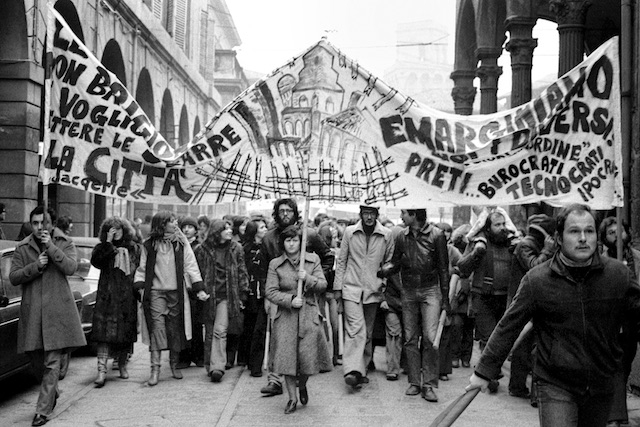1968 is the peak of human evolution, when techno-scientific knowledge and social consciousness had finally converged to the fullest extent.
Then, after a decade of uncertainty, Steve Wozniak and Steve Jobs’s founding of Apple in 1977 and the Sex Pistols declaration the same year that future didn’t exist, marked the diverging of those two trends: the expansion of technological knowledge and of technological applications continued steadily and accelerated; while there was a sharp downturn in social consciousness. Fifty years later years, as the kingdom of Artificial Intelligence is being inaugurated, humankind is officially entering the age of Dementia. Technology has gained increasing power over social life, while society has a decreasing power on technology, and is no more able to govern itself, and techno-automaton (the so-called governance) takes control of the economy and over daily life.
I was eighteen years old when I entered the University of Bologna, and I started occupying since the first months of that year. And contrary to what conformists think, that was possibly the best condition for learning: occupation was a condition for sharing knowledge, for taking part in the social processes and for linking theoretical research, artistic expression and political action. Everybody was expecting a long-lasting process of social emancipation from misery and exploitation, but this expectation was totally false, as now we know.
Why have the expectations of 50 years ago been denied? What has provoked this sort of reversal of imagination? This is the question we should ask nowadays. In 1968, imagination was reclaimed as a force for social transformation. In fact, imagination seized power. But this did not initiate a process of liberation. On the contrary, imagination has now become the hostage of power.
In Paris, the insurgents were shouting: “L’imagination au pouvoir!” Fifty years after, we might say that imagination now rests only in the hands of power. The social mind is obsessed by the repetition of the mantra of economic competition, and social impoverishment is pushing people towards the mythology of belonging: aggressiveness, and war.
Is there a way out?
We should be able to act as Baron Munchausen, who, having fallen into a ditch, lifted himself out of it by pulling on his own pigtail. This self-creative act (the invention of something from nothing) is the effect of a movement.
This is why, in order to avoid the final suicide that will follow the long-lasting wave of depression produced by the obsession with neoliberalism, we need a return of the energy that sprang up in 1968.
From the May 2018 issue of ArtReview
